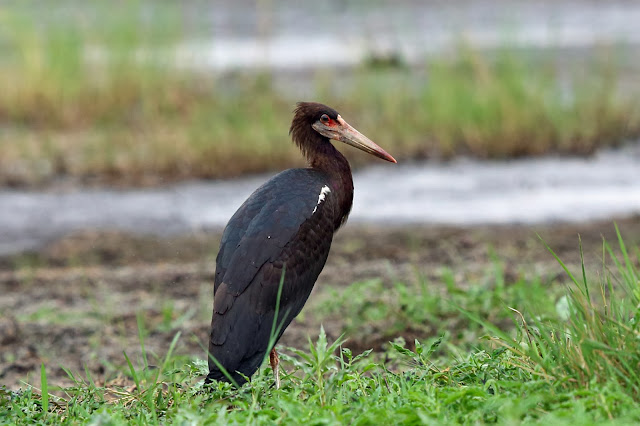The Plant
Manager called me early afternoon to say he’d found a Hamerkop nest by one of
the small dams and was a bit concerned as they urgently needed to excavate
sediments out of the dam which is badly silted-up. I went down and had a look
and sure enough there was a monster mess of wood in a tree, passing for a
Hamerkop nest. No sign of the adults but they’re often on the dams around the
plant looking primarily for amphibian prey. Many years ago when I worked in the
Central African Republic I discovered in that part of the world at least that
the Hamerkop was revered and feared in equal measure. No-one could believe that
such a small bird needed such a huge nest (they can extend to over one tonne of
material) and they believed that Hamerkop’s were indeed Witch Doctors and
transformed into human form at night to wreak havoc. Hmm…
I decided
that as I was out of the office I’d head down to the tailings dam on the
pretense of checking the cracks in the causeway but really wanting to have a
quick scout for birds. Driving down I had a real WTF is that moment as a really
odd looking pale passerine popped up on the fence next to the road. I spun a
U-turn and cruised back to the spot and could see the bird still there, without
binoculars it was pretty hard to see what I was looking at but it appeared to
be at least partially albinistic or very pale leucistic. Shape, size and call
indicated probably a Short-winged Cisticola, and it was with a normal plumaged
individual of the same species. Will have to go back some time and try and get
photos.
Driving out
on the tailings causeway I noticed that existing cracks had widened and
deepened and more were appearing and then I got to the end and “…WTF is that”?!
Another pale looking, but much larger, passerine perched on a grass stem. I was
puzzled but as I got closer it flushed and flew revealing a white rump and my
brain clicked – Wattled Starling! OK, not rare, but another new species for the
site and a good result. The list is up to 314 now. Without binoculars I could
only look at birds close by but this included a sad looking Abdim’s Stork with a
broken tarsus. The Black-winged Stilt was still brooding and a second female
was now sitting just a few metres away. I watched both birds dipping breast
feathers into nearby water and coming back to cool the eggs, to be fair it was
mid-thirties in the shade, and they didn’t have any! Pretty neat
behavior to observe though.
 |
| Abdim's Stork, Frontier Mine, DR Congo |
I dropped by the house briefly early evening before heading up to the club and the Barn Owl was perched in a tree in the garden again. Up at the club one of the small Impala herds passed through grazing on the lawn and amongst them were the first young of the year, perhaps three or four but difficult to see in the shadows. They looked pretty small, one to two weeks old maximum.
No comments:
Post a Comment